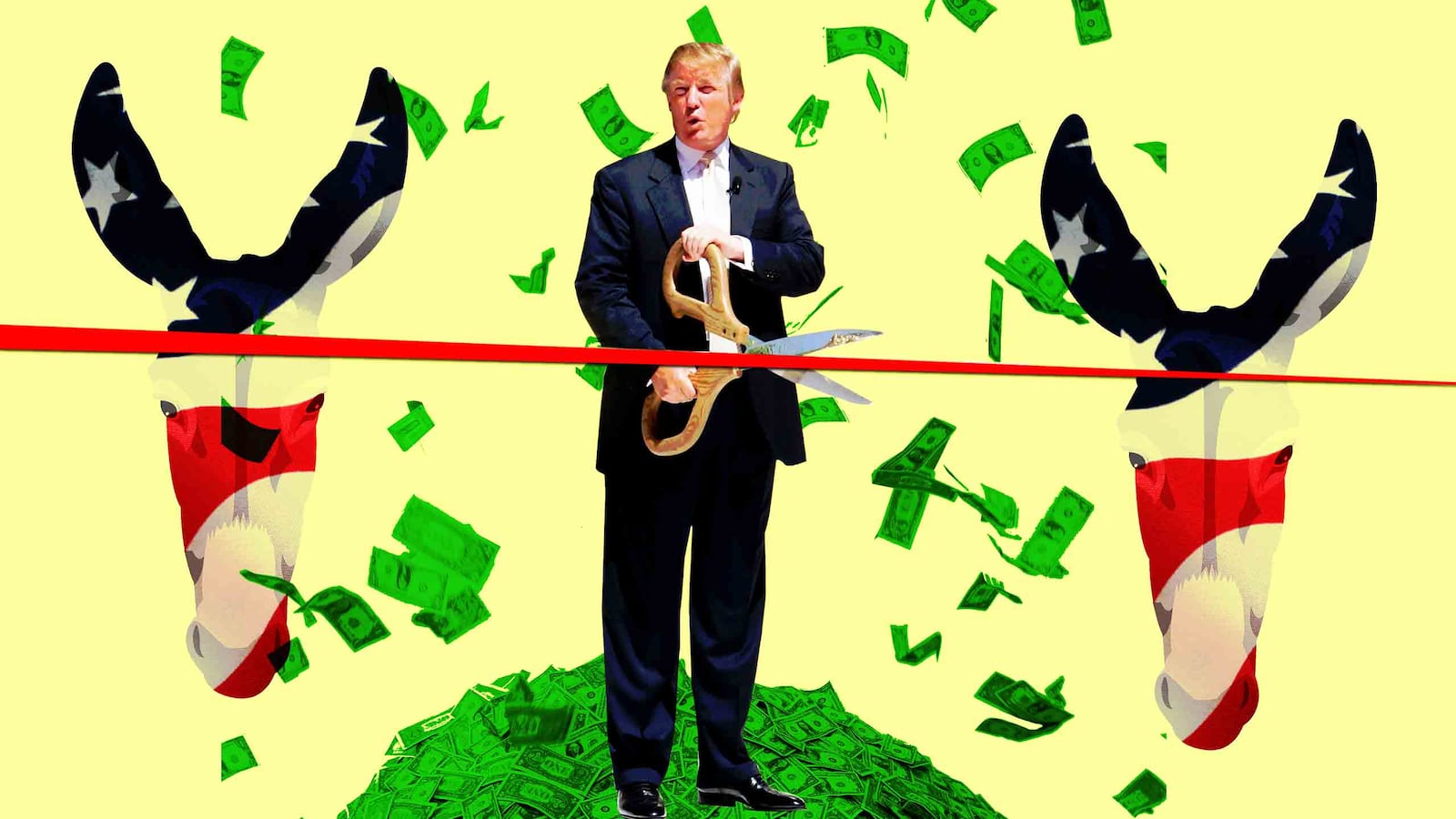During his first six months in office, Donald Trump’s top trade official met with a host of companies, trade associations, and industry groups. He also carved out a little time for an unsuspected visitor: an employee of Ralph Nader’s former progressive nonprofit.
Lori Wallach, the director of the group Public Citizen’s global trade arm, met with U.S. Trade Representative Robert Lighthizer in May and June, according to a copy of his schedule released through the Freedom of Information Act. In fact, she was one of the very few individuals with whom Lighthizer had multiple sit-downs during that time period.
At first glance, it is an odd pairing: a top official in a Republican administration talking shop with a leading consumer advocate. But the meetings shed light on the novel political allegiances that the president has tried to forge.
They also demonstrate the importance of a president’s high-level staff picks. Wallach has no love for Trump. She does, however, have respect for, if not a number of disagreements with, Lighthizer after having spent the past few years railing against his predecessor: the Obama administration’s Michael Froman.
“I’ve known Bob Lighthizer for a long time because there are not a lot of people who are trade experts and who know the substance of the agreements and the laws very well,” Wallach said in an interview on Monday. “I have closely followed his work. I’ve learned stuff from his perspective.”
Trump’s unorthodox policy platform has sparked a number of uncommon alliances. But nowhere has this been more evident than on the issue of global trade.
During the campaign and since assuming office, Trump has taken anti-free trade positions more in line with labor unions and progressive interest groups than with laissez-faire economics that defined Republican policy since the age of Ronald Reagan.
He vehemently opposed major trade pacts such as Trans Pacific Partnership, an Asian free trade deal that was pending at the time. And he turned his opposition to “unfair” practices abroad, and to trade deals that he characterized as one-sided, to build a populist appeal in parts of the country hit hard by post-war deindustrialization.
It wasn’t just Rust Belt voters who were intrigued, though. Trump’s trade policy positions also piqued Wallach’s interest. And in the spring she requested a meeting with Lighthizer. They met at the USTR building next to the White House on June 14, and were joined by Peter Navarro, Trump’s director of trade and industrial policy, according to the FOIA’d schedules, which were obtained and posted online by the website Alt Gov.
Wallach and Lighthizer met again on June 28, according to the FOIA’d schedule, and she said they met once more since then.
As important as areas of substantive agreement, Wallach said, has been Lighthizer’s style in soliciting input from outside experts and stakeholders on trade issues. “To his credit, he will talk to basically anyone who has a good idea or who has a concern,” Wallach said. “I think that his approach of being respectful and basically available to members of congress has also been something that has won him some respect and some trust among Democrats.”
One of those Democrats, Rep. Rosa DeLauro (D-CT), said she helped organize a meeting with fellow progressives and Lighthizer in September. Like Wallach, she contrasted Lighthizer favorably with his predecessor. She also scoffed at how she and TPP opponents were “pilloried” and viewed as “luddites” who were “never going to be for any kind of trade agreement” which, she added, was “not true.”
“I do,” she said, when asked if she felt Lighthizer and, by extension, the administration truly valued labor and even organized labor. “We had a good conversation and I actually did say to him, ‘Look, I have read some of your statements and frankly I didn’t hear members of the Obama administration have these types of views.’”
But she added a note of caution that with Trump one needed to “trust but verify.”
Trump has taken steps to upend current trade policy. In addition to scrapping TPP, he’s threatened to withdraw from NAFTA unless it is renegotiated. He’s threatened to scrap the Korean free trade agreement too. And he’s openly talked about punishing countries that devalue their currency and pull jobs out of the United States.
The approach has been, largely, more talk than action. But it has come to define Trump in the mind of voters; much as Wallach believes Obama’s trade policies soured his standing among the electorate.
It was Froman, she said, who “helped elect Trump by pushing the TPP relentlessly right through the swing states right through the election... Part of what that corporate trade perspective got was, ironically, a USTR whose philosophy is much more in line” with Public Citizen’s and those of labor unions and other free trade critics.
But there are limits to the odd-couple pairing. Public Citizen as a whole is vehemently anti-Trump, and the group boasts on its website that it is fighting him “on all fronts.” It tracks the extensive overlap between private industry and top Trump officials, points out alleged conflicts of interest, and posts information highly critical of major Trump administration legislative priorities, such as tax reform and environmental deregulation.
Like Public Citizen, DeLauro is a scathing Trump critic. But she has found some common ground on one of her key issues and is comfortable seeing how far it goes. “I think the conversations are important to have,” she says of her talks with Lighthizer. “But no, we wait.”






